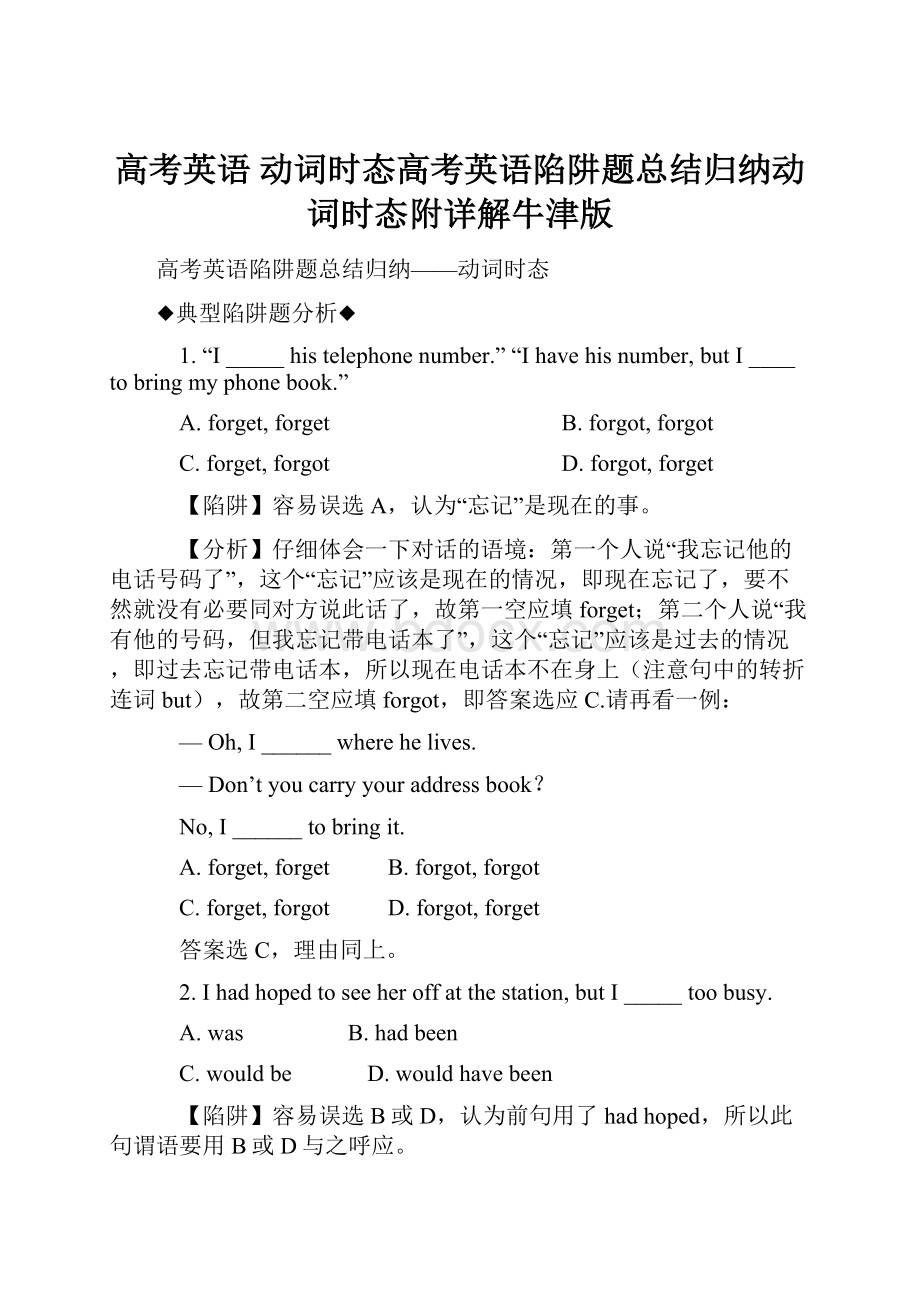高考英语 动词时态高考英语陷阱题总结归纳动词时态附详解牛津版.docx
《高考英语 动词时态高考英语陷阱题总结归纳动词时态附详解牛津版.docx》由会员分享,可在线阅读,更多相关《高考英语 动词时态高考英语陷阱题总结归纳动词时态附详解牛津版.docx(13页珍藏版)》请在冰豆网上搜索。

高考英语动词时态高考英语陷阱题总结归纳动词时态附详解牛津版
高考英语陷阱题总结归纳——动词时态
◆典型陷阱题分析◆
1.“I_____histelephonenumber.”“Ihavehisnumber,butI____tobringmyphonebook.”
A.forget,forget B.forgot,forgot
C.forget,forgot D.forgot,forget
【陷阱】容易误选A,认为“忘记”是现在的事。
【分析】仔细体会一下对话的语境:
第一个人说“我忘记他的电话号码了”,这个“忘记”应该是现在的情况,即现在忘记了,要不然就没有必要同对方说此话了,故第一空应填forget;第二个人说“我有他的号码,但我忘记带电话本了”,这个“忘记”应该是过去的情况,即过去忘记带电话本,所以现在电话本不在身上(注意句中的转折连词but),故第二空应填forgot,即答案选应C.请再看一例:
—Oh,I______wherehelives.
—Don’tyoucarryyouraddressbook?
No,I______tobringit.
A.forget,forget B.forgot,forgot
C.forget,forgot D.forgot,forget
答案选C,理由同上。
2.Ihadhopedtoseeheroffatthestation,butI_____toobusy.
A.was B.hadbeen
C.wouldbe D.wouldhavebeen
【陷阱】容易误选B或D,认为前句用了hadhoped,所以此句谓语要用B或D与之呼应。
【分析】但正确答案为A,前一句谓语用hadhoped,表示的是过去未曾实现的想法或打算,可以译为“本想”,而后一句说“我太忙”,这是陈述过去的一个事实,所以要用一般过去时。
请做以下类似试题(答案均为A):
(1)Wehadhopedtocatchthe10:
20train,but_____itwasgone.
A.found B.hadfound
C.wouldfind D.wouldhavefound
(2)Wehadhopedthatyouwouldbeabletovisitus,butyou_____.
A.didn’t B.hadn’t
C.needn’t D.wouldnothave
(3)Wehadwantedtocometoseehim,butwe____notime.
A.had B.hadhad
C.wouldhave D.wouldhavehad
(4)Ihadexpectedtocomeovertoseeyoulastnight,butsomeone______andIcouldn’tgetaway.
A.called B.hadcalled
C.wouldcallD.wouldhavecalled
(5)Thetrafficaccidentwouldn’thavehappenedyesterday,butthedriver_______reallycareless.
A.wasB.is
C.wereD.hadbeen
3.Dearme!
Just_____atthetime!
I_____noideaitwassolate.
A.look,have B.looking,had
C.look,hadD.looking,have
【陷阱】此题容易误选D,认为第一空用现在分词表伴随,第二空填have的一般现在时,以保持与前面时态的一致性。
【分析】其实,此题应选C,第一空应填look,因为这是祈使句的谓语;第二空应填had,因为前一句说“看看时间吧”,这一看当然知道了现在很迟的情形,“不知道这么迟了”显然应是“过去”的事,故应用一般过去时态,许多同学由于忽略这一隐含的语境而误选。
4.“Yourphonenumberagain?
I_____quitecatchit.”“It’s4331577”
A.didn’tB.couldn’t
C.don’t D.can’t
【陷阱】此题容易误选C,认为此处要用一般现在时态,表示现在“没听清对方的话”。
【分析】其实,此题答案应选A,根据上文的语境“请把你的电话号码再说一遍好吗?
”可知“没听清对方的电话号码”应是在说此话以前,故应用一般过去时态。
请看以下类似试题:
(1)“MrSmithisn’tcomingtonight.”“Buthe_____.”
A.promises B.promised
C.willpromise D.hadpromised
答案选B,“他答应(要来)”应发生在过去。
(2)“Hey,lookwhereyouaregoing!
”“Oh,I’mterriblysorry._____.”
A.I’mnotnoticing B.Iwasn’tnoticing
C.Ihaven’tnoticed D.Idon’tnotice
答案选B,“我没注意”是对方提醒之前的事,现经对方一提醒,当然注意到了。
(3)“Ohit’syou!
I________you.”“I’vehadmyhaircut.”
A.didn’trealize B.haven’trealized
C.didn’trecognize D.don’trecognized
答案选C.“没认出是你”是说此话之前的事,说此话时显然已经认出了对方。
(4)“What’shernewtelephonenumber?
”“Oh,I_____.”
A.forget B.forgot
C.hadforgotten D.amforgetting
此题应选A,从语境上看,“忘记”的时间应是现在,即指现在不记得了。
(5)“Sinceyou’veagreedtogo,whyaren’tyougettingready?
”“ButI______thatyouwouldhavemestartatonce.”
A.don’trealize B.didn’trealize
C.hadn’trealized D.haven’trealized
答案选B.“没意识到”是对方提醒之前的事。
(6)“It’stwelveo’clock,IthinkImustbeoffnow.”“Oh,really?
I______itatall.”
A.don’trealize B.haven’trealized
C.didn’trealize D.hadn’trealized
答案选C.“没意识到”是在听到的话之前的事。
5.MrSmith______abookaboutChinalastyearbutIdon’tknowwhetherhehasfinishedit.
A.haswritten B.wrote
C.hadwritten D.waswriting
【陷阱】容易误选B或C.
【分析】此题应选D,这是由butIdon’tknowwhetherhehasfinishedit这一句话的语境决定的,全句意为“史密斯先生去年在写一本书,但我不知道他现在是否写完了”。
有的同学可能由于受lastyear的影响而误选B.但若选B,则句子前半部分的意思则变为“史密斯先生去年写了一本书”,既然是“写了”,那么这与下文的“但我不知道他现在是否写完了”相矛盾。
6.Hehaschangedalot.He_______notwhathe_______.
A.is,is B.was,was
C.is,was D.was,is
【陷阱】几个干扰项均有可能误选。
【分析】最佳答案选C,上文说“他”变化很大,即“他”现在不是过去的那个样子了,故第一空填is,第二空填was(其实第二空也可用usedtobe)。
请看类例:
“Whatplaceisit?
”“Haven’tyoufoundoutwe_____backwherewe______?
”
A.were,hadbeen B.havebeen,are
C.are,wereD.are,hadbeen
答案选C,Wearebackwherewewere的意思是“我们(现在)又回到刚才来过的地方”。
7.Heisverybusy.Idon’tknowifhe_____ornottomorrow.
A.come B.comes
C.willcomeD.iscoming
【陷阱】此题容易误选B.认为if引导的是条件状语从句,从句谓语要用一般现在时表示将来意义。
【分析】其实,此题答案应选C,句中if引导的不是条件状语从句(即if≠如果),而是宾语从句(即if=是否),句意为“他很忙,我不知道明天他是否会来。
”请看以下类似试题:
(1)Idon’tknowifshe_____,butifshe____Iwillletyouknow.
A.comes,comes B.willcome,willcome
C.comes,willcome D.willcome,comes
答案选D,第一个if引导的是宾语从句,第二个if引导的是条件状语从句。
(2)“When_____hecome?
”“Idon’tknow,butwhenhe_____,I’lltellyou.”
A.does,comes B.will,willcome
C.does,willcome D.will,comes
答案选D,第一个when疑问副词,用于引出一个特殊疑问句;第二个when是从属连词,用于引导时间状语从句。
(3)“Whenhe_____isnotknownyet.”“Butwhenhe____,hewillbewarmlywelcomed.”
A.comes,comes B.willcome,willcome
C.comes,willcome D.willcome,comes
答案选D,第一个when引导的是主语从句,第二个when引导的是时间状语从句。
8.Thebridge,which_____1688,needsrepairing.
A.isdatedfrom B.wasdatedfrom
C.datesfrom D.datedfrom
【陷阱】此题容易误选B或D,认为句中用了1688这个过去时间,所以应选过去时态,又因为datefrom不用于被动语态,所以只能选D.
【分析】其实此题的最佳答案应是C,因为datefrom的意思是“自某时起存在至今”(=haveexistedsince),它通常用于一般现在时,而不用过去时态(尽管其后接的总是表示过去的时间)。
如:
Thechurchdatesfrom1176.这座教堂是六世纪建的。
Thecastledatesfromthe14thcentury.这座城堡是14世纪建的。
但若所谈论的东西现在已不复存在,则可用一般过去时。
如:
Thechurch,whichdatedfromthe13thcentury,wasdestroyedinanearthquaketwoyearsago. 那座教堂是13世纪建成的,两年前在一次地震中被毁了。
注:
与datefrom同义的datebackto也有类似用法。
9.“You’veleftthelighton.”“Oh,soIhave._____andturnitoff.”
A.I’llgo B.I’vegone
C.Igo D.I’mgoing
【陷阱】容易误选D.
【分析】A和D两者均可表示将来,填入空格处似乎都可以。
但实际上只有A是最佳的,因为根据上下文的语境来看,“我去把灯关掉”这一行为是说话人听了对方的话后临时想到的,而不是事先准备的。
而按英语习惯:
will和begoingto后接动词原形均可表示意图,但意图有强弱之分,如果是事先考虑过的意图,要用begoingto;如果不是事先考虑过的,而是说话时刻才临时想到的意图,则用will.比较:
“I’vecomeoutwithoutanymoney.”“Nevermind,Iwilllendyousome.”“我出来没带钱。
”“没关系,我借给你。
”(句中用willlend,表示“借”钱给对方是临时想到的,即听了对方的话后临时作出的反应)
I’veboughtatypewriterandI’mgoingtolearntotype.我买了台打字机,我想学打字。
(句中用begoingtolearntotype,表示说话人要学打字是事先准备的,并为此买了台打字机)
◆精编陷阱题训练◆
1.Lookatthatlittleboywanderingabout—perhapshe_____hismother.
A.willlose B.islosing
C.hadlost D.haslost
2.It’sgoodthatwe_____totheparkbecauseit’sstartedtorain.
A.don’tgo B.hadn’tgone
C.didn’tgo D.wasn’tgoing
3.I_____forfiveminutes;whydon’ttheycome?
A.amcalling B.called
C.wascalling D.havebeencalling
4.You_____yourturnsoyou’llhavetowait.
A.willmiss B.havemissed
C.aremissing D.hadmissed
5.We_____tomovebutarestillconsideringwheretogoto.
A.aredeciding B.decided
C.havedecided D.haddecided
6.Ileftmypenonthedeskandnowit’sgone;who_____it?
A.took B.hastaken
C.willtake D.hadtaken
7.Theywon’tbuyanynewclothesbecausethey_____moneytobuyanewcar.
A.save B.weresaving
C.havesaved D.aresaving
8.I_____yourlastpoint—couldyousayitagain?
A.didn’tquitecatch B.don’tquitecatch
C.hadn’tquitecatch D.can’tquitecatch
9.You’llneverguesswhoImettoday—myoldteacher!
We_____for20years.
A.don’tmeet B.haven’tmet
C.hadn’tmet D.couldn’tmeet
10.IfeelsureI_____herbeforesomewhere.
A.wastomeet B.havemet
C.hadmet D.wouldmeet
11.Theyhaven’tarrivedyetbutwe_____thematanymoment.
A.areexpected B.haveexpected
C.areexpecting D.willexpect
12.Ithinkyoumustbemistakenaboutseeinghimatthetheatre;I’msurehe_____abroadallweek.
A.is B.was
C.hasbeen D.hadbeen
13.Thestudents_______busilywhenMissBrownwenttogetabookshe_______intheoffice.
A.hadwritten,left B.werewriting,hasleft
C.hadwritten,hadleft D.werewriting,hadleft
14.Itriedtophoneher,butevenasI_____shewasleavingthebuilding.
A.phoned B.wouldphone
C.hadphoned D.wasphoning
15.“Isupposeyou_____thatreportyet?
”“Ifinishedityesterday,asamatteroffact.”
A.didn’tfinish B.haven’tfinished
C.hadn’tfinished D.wasn’tfinishing
16.—Didn’ttheguardseehimbreakingintothebank?
—No,he_______intheotherdirection.
A.waslooking B.hadlooked
C.looked D.islooking
17.Howcanyoupossiblymissthenews?
It_______onTValldaylong.
A.hasbeen B.hadbeen
C.was D.willbe
18.“Ithoughtyoumighthavegotdrunk.”“Yes,I______.”
A.almosthave B.almosthad
C.almostdid D.mighthave
19.You______